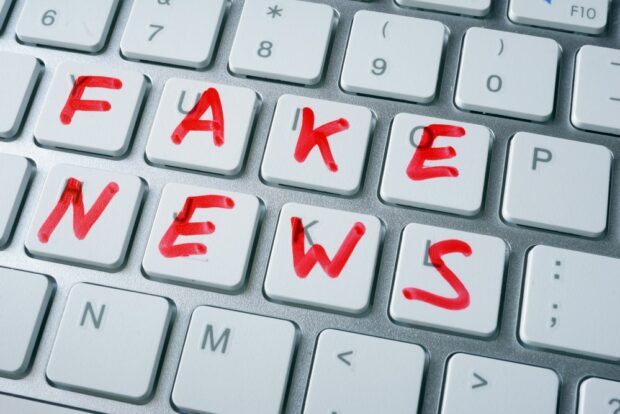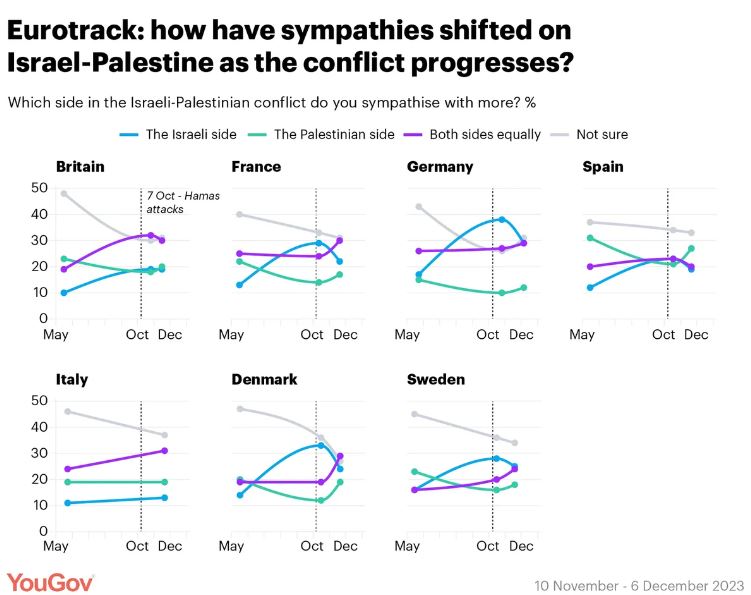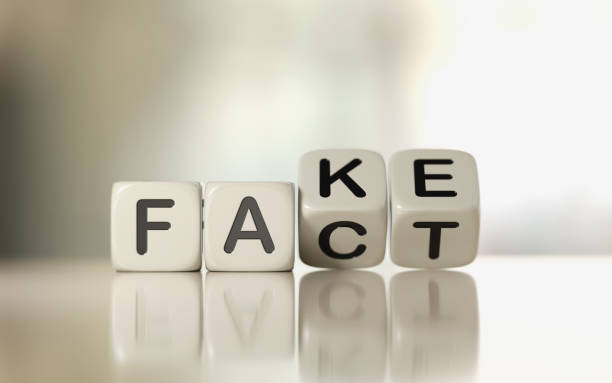Events in Palestine and the Israeli government’s actions contrary to international law have raised opposition and criticism around the world. While the institutional position of many countries remains pro-Israel, Israel’s genocidal behaviour and the continuing deaths in Palestine are diminishing international sympathy in terms of public opinion. This is indicated by a report in Time magazine[1], which referred to a Morning Consult poll showing a significant drop in favourability towards the Israeli government since the start of the Gaza war in October 2023, with a decline of 18.5%. Favourability that has declined in 42 of the 43 countries surveyed. Similarly, an analysis by YouGov[2] (2), an international market research and data analysis company, showed an increase in sympathy for the Palestinian people in European countries, with Spain being the most pro-Palestinian country of all, with 27% of sympathisers.
Although international society can be seen to be committed to a ceasefire in Palestine, the history and present of the conflict remain blurred in the collective international imagination. Since before the founding of Israel as a nation in 1948, a powerful Zionist discourse has spread around the world, with sufficient means of dissemination to penetrate the consciences of many citizens in all parts of the world. This narrative, rather than providing an objective and empirical view of the history and present of the conflict, serves the interests of the Zionist political-nationalist project, distorting the history and reality of the conflict to suit its needs.
It is increasingly common to find news that, far from being informative and objective, has a determined, sensationalist or self-interested character.
This disinformation phenomenon is part of the reality of today’s globalised and hyper-connected world, and has made use of new technologies and the media to spread to every conceivable place and field. In this sense, the term post-truth refers to the deliberate distortion of a reality in order to influence public opinion and social attitudes. In other words, it refers to the dissemination of non-objective information with the intention of generating certain emotions or attitudes in the recipients, such as fear, rejection, discrediting of a group or individual, etc. Thus, in the face of a day-to-day life characterised by a continuous and immediate news bombardment, it is increasingly common to find news that, far from being informative and objective, has a determined, sensationalist or self-interested character.
Although the media have been a political weapon since the beginning of time, especially in conflict situations, the disinformation and post-truth phenomena have increased their risk. This is a general problem that stands between citizens trying to inform themselves about reality and the political, economic and ideological interests of certain figures or groups with the power to influence media communication.
Although most people believe they have the critical capacity to differentiate between true and false data, a survey conducted by Simple Lógica[3], a company specialising in social research, shows that this is not the case. Of the Spaniards surveyed, 60% thought they knew how to detect fake news, but the reality was that 86% confused them and only 14% differentiated between them. In relation to this study, Antonio L. Manzanero, director of the Psychology of Testimony Research Group at the UCM, stated that “the effect of fake news on individual memory is important, being potentially capable of rewriting history”.
The reconstruction of history and social reality becomes entangled with blatantly false ideas and opinions that are spread by politicians, important figures and even “reliable” media
Since the last century, historians such as Hayden White[4] or Eric Wolf[5] have argued about the impossibility of positivity and objectivity in history, understanding that history is constructed on the basis of stories and data that the historian shapes from a particular perspective and that, therefore, there is always a literary component or human creation in the recomposition of historical facts. In this sense, some theoretical thinkers have reflected on the possibility of knowing social reality empirically, and have considered that truth has more to do with social relations than with an objective social reality in itself[6]. Therefore, truth about the world can be understood as a polyhedral reality that is made up of various narratives rather than as a structured whole[7].
These sociological insights demonstrate the difficulty of approaching history as well as social and international reality in an objective way. And yet, the experience of disinformation and post-truth in recent decades has further complicated this situation. The reconstruction of history and social reality becomes entangled with blatantly false ideas and opinions that are spread by politicians, important figures and even “reliable” media, which prioritise their interests over the objectivity of historical and social reality. As discussed above, Zionism[8] is not left behind in this endeavour, but has also benefited from this reality to distort the history and present of the conflict to fit its own perceptions and interests, as well as to generate and expand a discourse that demonises the Palestinian people.
At the same time, these misconceptions have been spread in the international media, as well as by other political and ideological leaders. An example of this is the use of the word “anti-Semitic” in the international context, referring to the discrimination against Jews. El-Awawdeh de la Torre[9] argues that “Semitic” refers to the peoples and languages that coexisted in the Middle East, of which three survive: Arabic, Ethiopian and Hebrew, the latter representing 1% of the total. Therefore, it is worth considering that the understanding of “anti-Semite” in reference to those people or acts opposed to the Israeli government is an appropriation of the term by Zionism. After this reflection and clarifying that Palestinians are also Semites, El-Awawdeh[10] asks “who are and act as anti-Semites?”
These are distorted terms, concepts and ideas that are spread across the international space and taken for granted, without first questioning their provenance or veracity. We see this when, for example, the state of Israel is referred to as a fully-fledged state, despite the fact that it was built in contravention of international law. It also happens when news is disseminated unfiltered and uncorroborated, as when important personalities such as the president of the United States announce massacres by Palestinians that have turned out to be untrue. Or, conversely, when the harsh reality to which the Israelis subject the Palestinians on a daily basis is normalised or silenced.
And this can be seen not only in the political sphere and in the field of communication or social networks. It is also possible to find disinformation in entertainment. This is the case, for example, of series and films offered on platforms such as Netflix. Hadwa Shahwan and Jofre Leal[11] (9) comment that series such as “One Of Us” or “Unorthodox” have a Zionist background and a clear intention to manipulate. In this case, these series seek to conflate the Jewish religion with the Israeli and to discredit other interpretations and understandings of Judaism that are far removed from the ideals of Zionism, by seeking the public’s rejection of this religion and the whitewashing of Israeli culture by presenting it with Westernised and “open” ideals.
It is therefore interesting to note that the way in which Judaism is understood and practised by the Israeli government in no way represents the totality of the religion. Judaism is a universal religion, which belongs to its believers, and within it not only counts the individuality of each person, but it is possible to appreciate diverse interpretations, sensibilities and religious groups. In fact, many Jews of different tendencies are completely opposed to the Israeli government and even question the existence of Israel, considering that, not only they do not represent the will of the Jewish people, but that they are a sign of imperialism, as well as condemning the genocidal acts against the Palestinian people.
In this regard, it is worth mentioning the existence of multiple and diverse groups that, from the Jewish religion, oppose Israel. These include Breaking The Silence (BTS), Shovrim Shtika in Hebrew, an Israeli NGO founded by veterans of the Israel Defense Forces (IDF) who recount their dramatic experience in the Palestinian territories. There are also the Xeministim, Israeli students who refuse to join the army. Another interesting example is Neturei Karta, Guardians of the City in English, which is a conservative, religious Jewish organisation that opposes Zionism, the occupation of the Palestinian people and Israel as a state, based on the idea that Jews are forbidden to have their own state until the coming of the Messiah.
Making the Jewish opposition to Israel visible enables to dismantle Zionist disinformation and discard those considerations that understand the conflict from a religious calibre.
It is also possible to find examples of Jewish organisations and associations at the international level that oppose the war, such as Jewish Voice for Peace in the United States, Jews for Justice for Palestinians in Britain or European Jews for a Just Peace (EJJP) in Europe. Therefore, the strong criticism of Israel by Jewish religious or secular individuals and groups cannot be ignored, despite Zionist attempts to monopolise the representation of Judaism, to impose its truth on the whole world and to make its genocidal acts invisible for more than 70 years.
Making Jewish opposition to Israel visible enables, on the one hand, to dismantle Zionist disinformation. And it also allows us to discard those considerations, also widespread in the international imaginary, that understand the conflict from a religious perspective. It is not a war between Jews and Arabs, nor between Jews and Muslims. This belief is nothing more than another false idea to distract society from the reality and the brutal Israeli actions: the indiscriminate attacks, the destruction of homes, cities and everything that recalls Palestine, the forced displacements, the subjection to hunger and harsh living conditions, as well as the more than 30,000 fatalities on the Palestinian side, around half of whom are minors.
The decline of the Israeli government’s image in terms of international public opinion was mentioned at the beginning of the text. Also, the criticism of Jews opposed to Zionism and Israel has been discussed. However, given current events, one might ask how the fall in public opinion is not more pronounced. This is influenced by Zionist disinformation activity, whose ultimate intention is to discredit the Palestinians, presenting them to the public as the “uncivilised and violent”, while creating an image of Israelis as the “victimised, those of reason and progress”. And this, at the same time that the massacre in Palestine is perpetuated before the entire international community, accompanied by openly genocidal statements coming from the highest levels of the Israeli government.
Given this situation, it should be emphasized that there are neither “bad guys” nor “good guys”, nor is there an absolute truth or a definitive version of the facts. Today, one of the main obstacles to public access to objective and quality information is disinformation, post-truth and outright lies. Faced with this challenge, what we citizens have left when it comes to informing ourselves about any aspect is critical thinking and to doubt about what, who, when and with what intention any information is said or published. And, in the face of those aspects that do not convince us, we must build counter-narratives that, from the base of society, refute the falsehoods that seek the construction of a reality based on the interests of certain personalities and power groups.
Ainara García Sánchez
References
[1] Gordon, A. (2024) “New Polling Shows How Much Global Support Israel Has Lost.” The Time, January 17, 2024. Available at: https://time.com/6559293/morning-consult-israel-global-opinion/
[2] Simth, M. (2023). “Israel-Palestine: fundamental attitudes to the conflict among Western Europeans”. YouGov. 20 December 2023. Available at: https://yougov.co.uk/politics/articles/48218-israel-palestine-fundamental-attitudes-to-the-conflict-among-western-europeans
[3] Simple Logic (2017). I Study on the impact of Fake News in Spain”. Available at: https://www.simplelogica.com/wp-content/uploads/2018/10/estudiopescanova.pdf
[4] White, H. (1973). Metahistory: The History Imagination in Nineteenth-Century Europe. Johns Hopkins University Press.
[5] Wolf, E. (1982). Europe and the prople without history. University of California Press.
[6] Berger, P. L. and Luckmann, T. (1986). La construcción social de la realidad. Amorrortu.
[7] Lyotard, J.F. (1979). La Condition postmoderne: Rapport sur le savoir. Minuit.
[8] Remember that Zionism is an ideology and a nationalist political movement that advocates the creation of a state exclusively for Jews in what they consider the Promised Land, the territory belonging to ancient Palestine. Not to be confused with Judaism, which is the Jewish religion.
[9] El-Awawdeh de la Torre, S. (2023). “La Guerra de la desinformación: desmontando mitos sionistas”. El Salto Blog, October 19, 2023. Available at: https://www.elsaltodiario.com/revista-pueblos/guerra-desinformacion-desmontando-mitos-sionistas
[10] Idem
[11] Hadwa Shahwan, N. and Jofre Leal, P. (2020). “Manipulación y desinformación como estrategias del sionismo”. TeleSUR Blog. April 19, 2020. Available at: https://www.telesurtv.net/bloggers/Manipulacion-y-desinformacion-como-estrategias-del-sionismo-20200419-0001.html


















No Comments